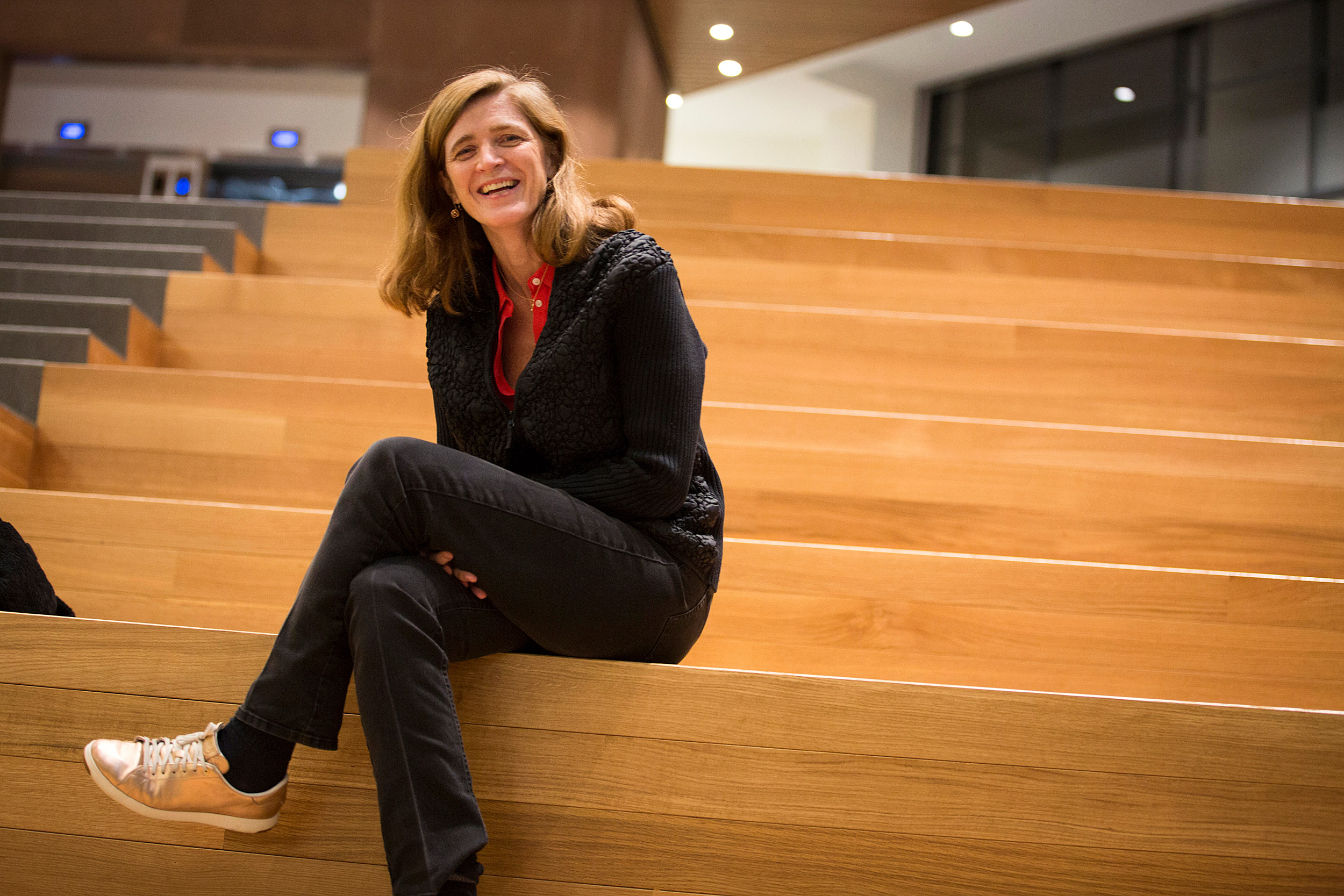
After eight years in the Obama administration, former U.N. Ambassador Samantha Power returns to Harvard. She talks to the Gazette about her time in the White House and reflects on being a civilian observer in the Trump era.
Stephanie Mitchell/Harvard Staff Photographer
Samantha Power: The world in her rearview mirror
Former U.N. ambassador, now back at Harvard, reflects on her eight years helping shape U.S. foreign policy
Author F. Scott Fitzgerald wrote that there are no second acts in American lives. But clearly, he never met Samantha Power.
Part jet-setting diplomat, part sneaker-clad advocate, the Harvard human-rights champion and scholar first shot to fame in 2003, when she won a Pulitzer Prize for her book on genocide, “A Problem from Hell.” Power, J.D. ’99, switched gears when she left Harvard Kennedy School (HKS) to join the longshot 2008 presidential campaign of a U.S. senator from Illinois named Barack Obama. When he was elected president, she became a special assistant to him, serving first on the National Security Council, and later, as U.S. ambassador to the United Nations.
More than eight years later, Power has returned to Harvard as the Anna Lindh Professor of the Practice of Global Leadership and Public Policy at HKS and professor of practice at Harvard Law School.
Power figures prominently in a new HBO documentary that debuted Jan. 19 called “The Final Year.” The film chronicles the behind-the-scenes whirl of key players on Obama’s foreign policy team, including Secretary of State John Kerry and speechwriter Ben Rhodes, the deputy national security adviser for strategic communications, as all three crisscross a world that seems on fire. They organize historic presidential visits to Hiroshima and Laos, and they grapple with the conflict in Syria and the resultant refugee crisis, the Ebola epidemic, mass abductions by Boko Haram militants, and the Iran nuclear negotiations, against the looming backdrop of the 2016 presidential campaign.
Power will discuss U.S. foreign policy Thursday afternoon at the Radcliffe Institute for Advanced Study, where she is also a 2017‒2018 fellow. (There is a waiting list for seating.) In advance of that session, she sat down with the Gazette to reflect on the ups and downs of her time in the U.S. government and how it feels to be off center stage politically, watching global affairs unfold.
Q&A
Samantha Power
GAZETTE: Now that you’ve had a year to process it, how do you view your time in the Obama administration? What are you most proud of accomplishing, and are there any misgivings or disappointments?
POWER: Definitely, there were both, but my main “headline” on government is that nothing in my life has been as rewarding, as impactful, as purposeful as the eight years I got to spend working in the Obama administration. For me, a textbook case of U.S. leadership that was used to harness a global response to a cataclysmic crisis was the Ebola response. … I was privileged to be at the center of that because Barack Obama decided to deploy 3,000 troops and health workers into the eye of the storm at a time when people were so panicked across the United States. As U.N. ambassador, I got to take his commitment and then try to leverage it with other countries and build a global coalition. And we did that. We defied all of the odds, building the airplane as we were flying it, to vanquish that epidemic.
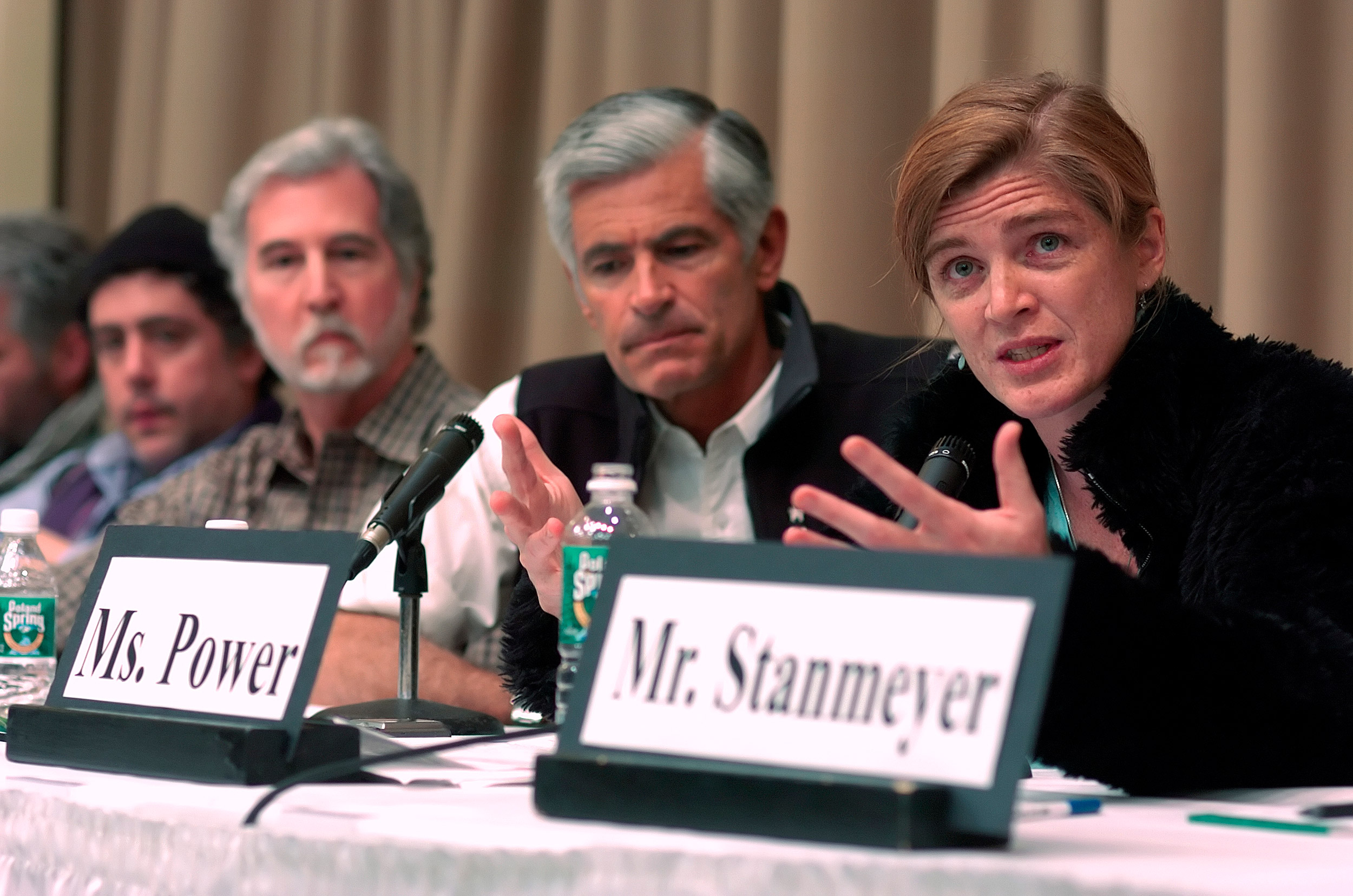
I feel sometimes when the United States talks about human rights or women’s rights, it can be very abstract. And so, with my team, about halfway through my time in New York at the U.N., we decided that we would focus on 20 women whose voices were being silenced because they had been made political prisoners in their own countries and that we would see what we could do to try to get these people out of jail. We ran this campaign called #FreeThe20 with women who’d been locked up in Ethiopia and Uzbekistan and China. Some of the people had even been locked up protesting sexual harassment — that was the case in China — at a time when the Chinese government was bragging about all it was doing to empower women.
And by virtue of our efforts, along with those of NGOs [non-government organizations], and members of Congress who got on board with this campaign, 16 out of the 20 women were, in the end, released from prison. … The only form of accountability that I and my team practiced was not “Did you give a great speech?” or “Are you respected around the world?” but was always about “Are there lives that are different concretely because of the work that we did?”
Syria stands out, of course, as the conflict that caused the most human suffering probably per square inch on planet Earth over the life of our time in government. But again, every tool in the toolbox, short of military force, we deployed. It’s just the complexity and brutality, frankly, of what was going on on the ground that made, for us, a solution elusive, it’s fair to say. And then, I also think if we had to do it again, I wish we had not gotten so entangled in the war in Yemen. Initially, to be defending our Saudi partners in the region made some sense — Iranian aggression, Iranian support for armed elements on the ground in Yemen — but then, as we backed the Saudi-led coalition, the amount of carnage inflicted from the air by the Saudi air force was so significant that I think there came a time where we should have pulled the plug on that. And I regret that we didn’t.
GAZETTE: For someone known as a vocal champion of action, you worked in an administration frequently criticized for its perceived inaction on a host of global issues and conflicts. Has your view of what the U.S. can and cannot do to solve problems evolved since you transitioned from academia to governing?
POWER: For the book I did called “A Problem from Hell,” which led me to Obama … I did hundreds of interviews with U.S. officials. So I was no stranger to understanding that constraints exist. Constraints exist in terms of the effectiveness of U.S. tools, in terms of domestic public opinion or congressional support, and some problems are really hard in the world. That was no secret to me even though I hadn’t served in the executive [branch] before. I think, if anything, I come out more idealistic and more struck by just what the United States can do when it puts its mind to it. I understand and appreciate the criticisms on Syria because it was such a case of savagery and had a set of knock-on effects, as well, regarding terrorism and refugee flow. I understand that criticism.
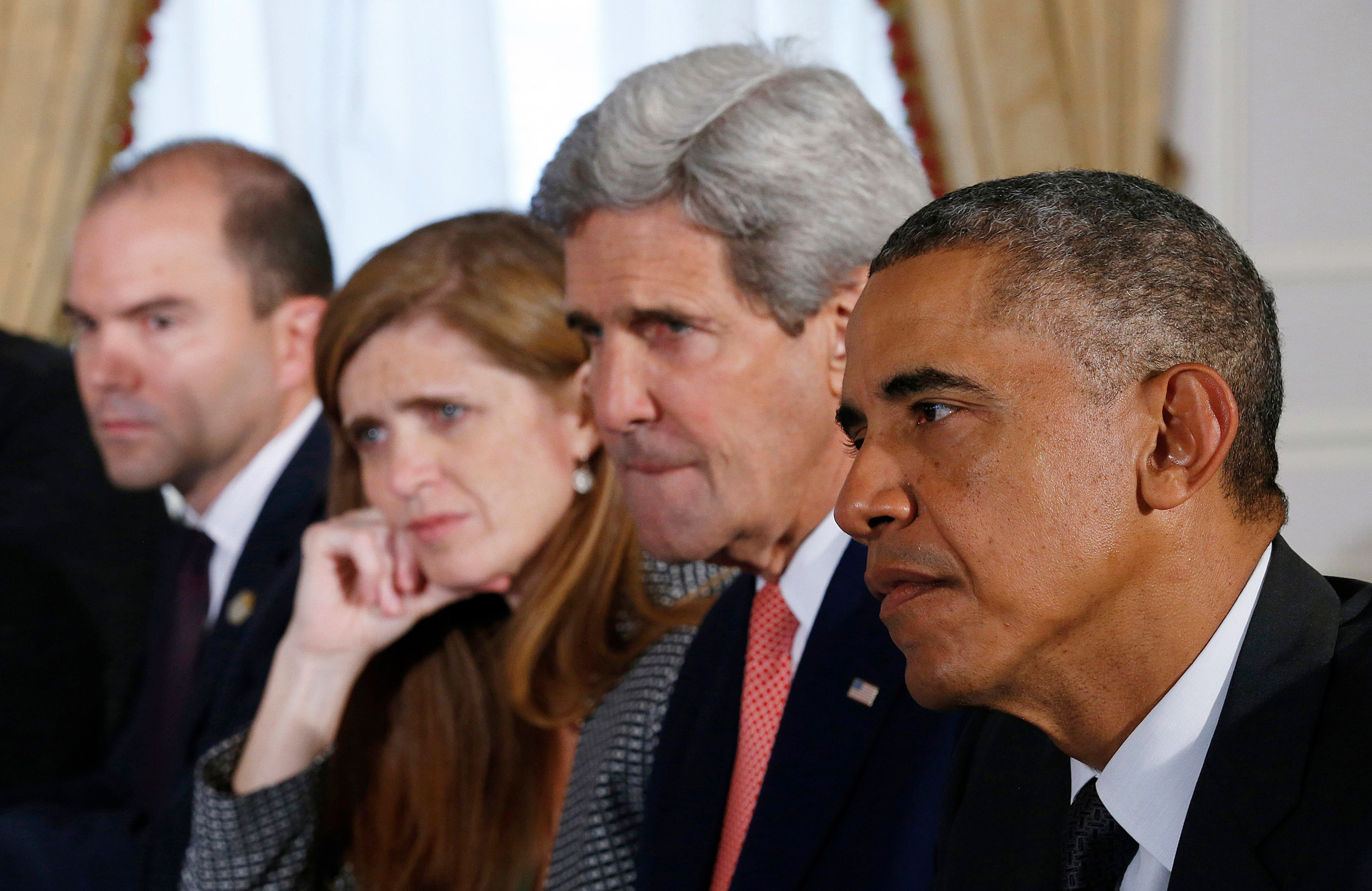
U.S. President Barack Obama holds a bilateral meeting with Ethiopia’s Prime Minister Hailemariam Desalegn (not pictured) in New York Sept. 25, 2014. With Obama from left are Deputy National Security Adviser Ben Rhodes, Power and Secretary of State John Kerry.
Photo by Kevin Lamarque/REUTERS
But in general, there is a habit that has grown up over the years where if something bad is happening in the world, it must be the U.S.’ fault. Sometimes we have it within our power and we turn away, and that is blameworthy. But it is also the case that the United States, as we saw in Iraq, even when it deploys more than 100,000 troops in someone else’s country, is likely not going to be able to simply dictate events. … That is one reason I opposed the war in Iraq in the first place.
But I think if you look at the president’s activism on climate, on Ebola, on actually moving to a very different approach in Afghanistan and Iraq where we focus on counterterrorism with a much smaller presence but also emphasize the governance dimension to that, if you look at our Iran deal on nuclear weapons to try to avoid a war, or the Cuba normalization, this was a very activist administration.
And the contrast with the current administration could not be more stark, not only because the current administration is pulling out of so many essential international frameworks, whether on trade or climate or nuclear weapons, but because we don’t have diplomatic initiatives, it seems, as they relate to problems that are happening in the world. No one has any idea what we are trying to get done currently as it even relates to the Syria conflict. No one looks to the United States, already just within a year, to be the lead actor in engineering a response to the Rohingya crisis [in Myanmar]. So, everything is relative. Because of how Syria turned out, I very much understand the criticisms vis-à-vis that conflict. But if you look at the full litany of issues on which the United States was the driver of a response, there’s almost nothing that happened within the international system that the Obama administration wasn’t driving either frontally or from behind the scenes.
GAZETTE: Is it difficult now to watch what is happening in the world from the sidelines? And how is the world changing since the U.S. has stepped back from its post-World War II role as a leader in world affairs?
POWER: Yes, of course it is painful to watch what’s happening, but not because I spent eight years of my life serving a different president and because we orchestrated these initiatives and now the initiatives are being taken away — not for that reason, but just because what is being done is dumb and dangerous. I’m a citizen, and I care passionately about our country. And this president is doing tremendous damage to our society, sowing divisions, waking up every morning and thinking “How do I pit one group of our society against another?” Attacking our democratic institutions, thereby ridding us of the voice that we’ve always been on behalf of democratic institutions in other countries, and the need for them. We have no credibility on those questions. The cruelty and the destructiveness of the approach being taken, for many, many citizens, is very unnerving and very upsetting.
And then, part of that is I’m watching an international order that the United States helped shape — not always perfectly, of course — but I’m watching that every day become one that now no longer has underpinning it the confidence that countries had that the United States would help maintain that order. Whether that’s because of the attacks on our allies, the withdrawal from international frameworks and treaties, or just the absence of initiative when it relates to contemporary problems, or even the defunding of really important international agencies, all of that sets up a situation where we have a leaderless world. But it also sets up a situation where China, which has a very different model in mind for what the international order should look like. … If you think you can just allow countries to do what they want within their borders, that’s a recipe for a very, very dangerous tomorrow.
China is relishing this moment of U.S. retreat. We see it in climate, where their companies are feeling now that they have a clean shot at dominating the renewables business. We see it at the U.N., where no longer is the United States mobilizing a coalition to block their efforts to avoid discussion of human rights situations within different countries. We see it on trade, where now that President Trump walked away from the Trans-Pacific Partnership, China is seeking to negotiate its own free-trade pact. So this administration, every day, serves up a new gift to a country that was already a major force in the international order and was going to be a major force ultimately anyway. But now we’re just surrendering the stage to them and hastening their domination of various dimensions of the international order.
GAZETTE: What do you think of the jobs Secretary of State Rex Tillerson and U.N. Ambassador Nikki Haley have done thus far?
POWER: I wouldn’t want the job of being a diplomat defending what Trump has done on a given day. I wouldn’t want the job of waking up every morning and seeing some new ally that we work with every day at the U.N. attacked with some tweet. I wouldn’t want the job of trying to stand up for human rights and democracy at the U.N. when my own president is attacking the media, judges, Hispanics, whoever it is on a given day. I think it’s very, very challenging.
On Tillerson, it’s very disappointing to see the absence of any articulated diplomatic agenda. John Kerry, you see in the film “The Final Year,” can barely carry himself up the stairs, he’s so exhausted from trying to tackle Yemen, the Paris agreement on climate, Syria, the Iran deal. For Tillerson, the only issue that we associate him with is his desire to cut the staff at the State Department.
This administration entered when we already had a situation where there were more individuals who served in Pentagon marching bands than serve as diplomats in our country. You can hardly say that the world suffers from too much diplomacy. And yet, for America’s diplomat-in-chief to make slashing the diplomatic corps his priority is bewildering and deeply problematic. Unfortunately, it makes the work that we do at Harvard and other institutes of higher learning more important because we’re going to have to recruit a whole new crop of young people to take up the mission of being America’s diplomats when we survey the wreckage and try to recover from it in the wake of this presidency.
GAZETTE: In “The Final Year,” you said Syria was “beyond frustrating” and “haunting” in part because it was an issue “where my thoughts and feelings and ideas have made such a marginal impact on desperate people.” What else do you wish had been done?
POWER: We didn’t use military force against the Assad regime there. I think the critics would say that we had a responsibility to try everything, given the knock-on effects of the conflict. But I don’t think anybody within the administration who advocated that course, who wanted to use force, for instance, after the chemical weapons attack that Assad’s regime carried out, I don’t think any of us could speak with any dogmatism that, had we done that, that things would look so very different afterward.
In Iraq, the Bush administration deployed more than 100,000 troops and still, years later, you had ISIS planting its flag there and drawing on the deep divisions within the society to carry out grotesque acts of violence. In Syria, you had the complete abdication of leadership and brutality by the Assad regime, plus Iran and Russia working on the ground on the side of the regime. Russian involvement was not a dimension you had in Iraq. So, there was certainly no silver bullet to Syria. But I think, given how much suffering occurred within Syria, the amount of instability caused by the conflict in the countries that surrounded it, the flow of refugees into Europe — which may well have been a factor behind Brexit — we definitely have to ask ourselves, “Gosh, really, was there not something that we could have done?”
And maybe the overemphasis on the military tool is not the right one. Maybe the diplomacy that Secretary Kerry carries out in the film in 2016, which he had really embarked upon in 2015, if something like that had been done back in 2011, could that have nipped it in the bud? These are counterfactuals we’ll never know the answer to, but I think a lot of us who are writing now and reflecting and teaching, we have a responsibility not to be defensive about that and really unpack what was available to us that we failed to follow through on.
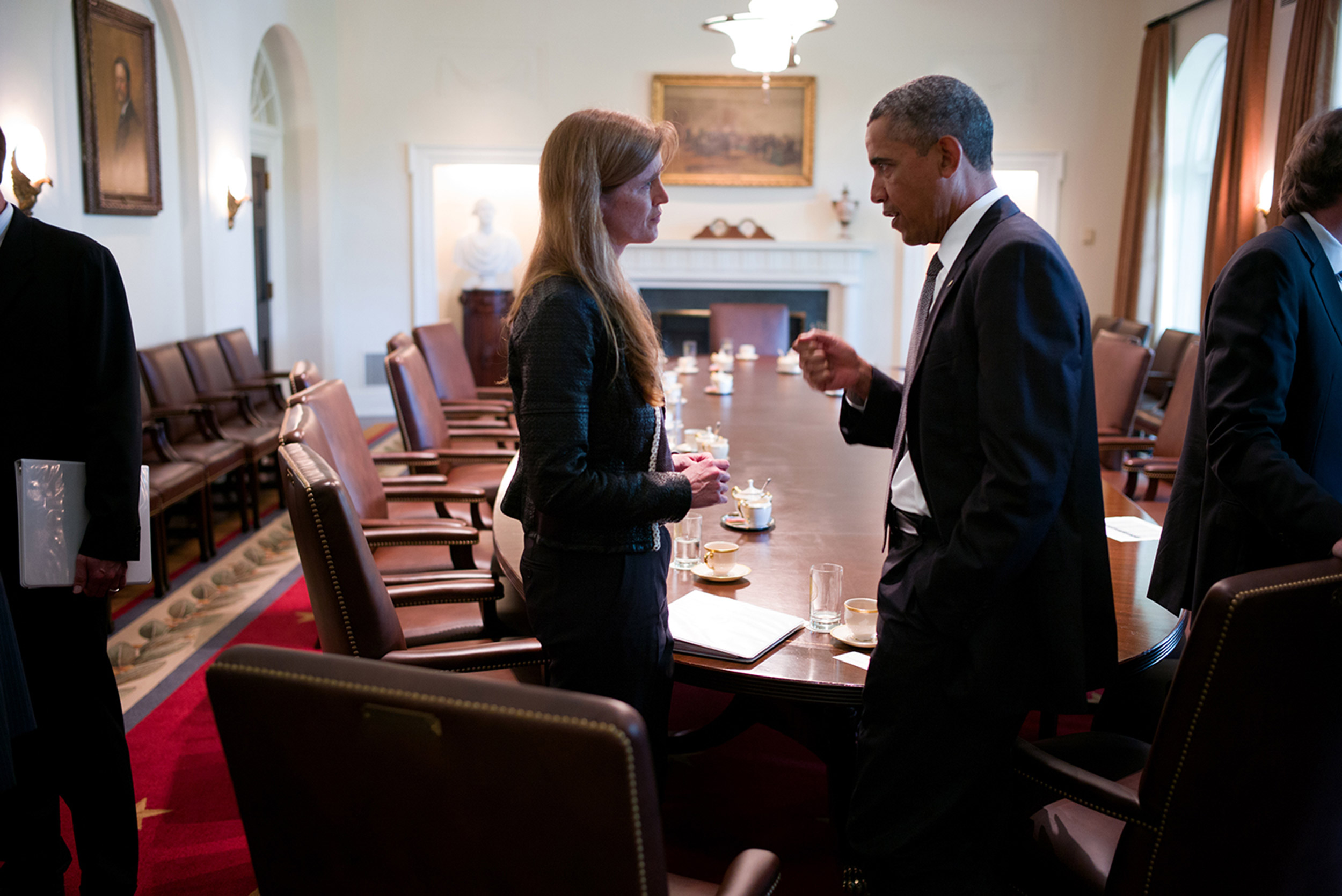
President Obama talks with Ambassador Power following a Cabinet meeting in the Cabinet Room of the White House, Sept. 12, 2013.
Official White House Photo by Pete Souza
GAZETTE: You famously condemned the Russian Federation in your final U.N. speech one year ago for destabilizing the world in an effort to tear down the existing world order. In the film, Obama’s deputy national security advisor, Ben Rhodes, concedes it took “too long” for the U.S. to realize that leader Vladimir Putin pursues his interests, not Russia’s. Did the U.S. misjudge the global threat posed by Putin?
POWER: The playbook that Russia executed around our election is one we had seen it do in Georgia before we took office, in Ukraine, Bulgaria, and Estonia. This hybrid warfare, this use of hacking, fake news, cyberattacks, that was evident to us. I think there are questions about whether more could have been done to shore up our defenses in light of that. The kind of alertness people have now to Russian hacking … would there have been a way for our society to be on guard in a manner that offered at least some inoculation? I ask that question because I think it’s legitimate. It’s shameful that the current administration is not seized with this issue because it just happened a year ago, and it’s inevitably going to happen again, whether it’s with Russia, China, or some other actor.
But the truth is that the U.S. government doesn’t have an obvious lever as it relates to social media, to fake news. We’re a democracy, where it would be very perilous if our government were in the business of deciding what was on one side of the line. But now that some companies themselves, like Facebook, are beginning to do this thinking, I believe we have to ask ourselves: “Shouldn’t they have been doing this thinking from the minute we saw Russia behave this way in Ukraine, given the strategic threat posed by Putin?” So now we just need them to accelerate that thinking and try to assist people. Many of us just read what we read and assume that if it’s coming into our feed it’s true. So blunting that impression is going to be very important, as is really looking out for who is making large ad buys that could affect how political candidates are seen or how divisive an issue becomes in our own society.
GAZETTE: If you were still at the U.N., what would you advise, if anything, be done in response to Putin’s interference in the 2016 elections of the U.S., France, Germany and the U.K., among other nations?
POWER: I don’t think you need to go to the U.N. and jump up and down about election interference. At the U.N., Russia is a permanent member of the Security Council with a veto, so you are disabled by the very countries that are themselves carrying out these assaults on our institutions. But certainly making sure in our diplomacy around the world, whether bilaterally, using the U.N. as a platform just to engage a lot other countries, or through our embassies throughout the world, we should be sharing everything we know about this playbook and about the tools we have found effective in combating the elements of this hybrid warfare. This is another reason it’s so problematic that we don’t have ambassadors in so many key countries to be leading this interface among democracies about how to make ourselves more resilient to this interference.
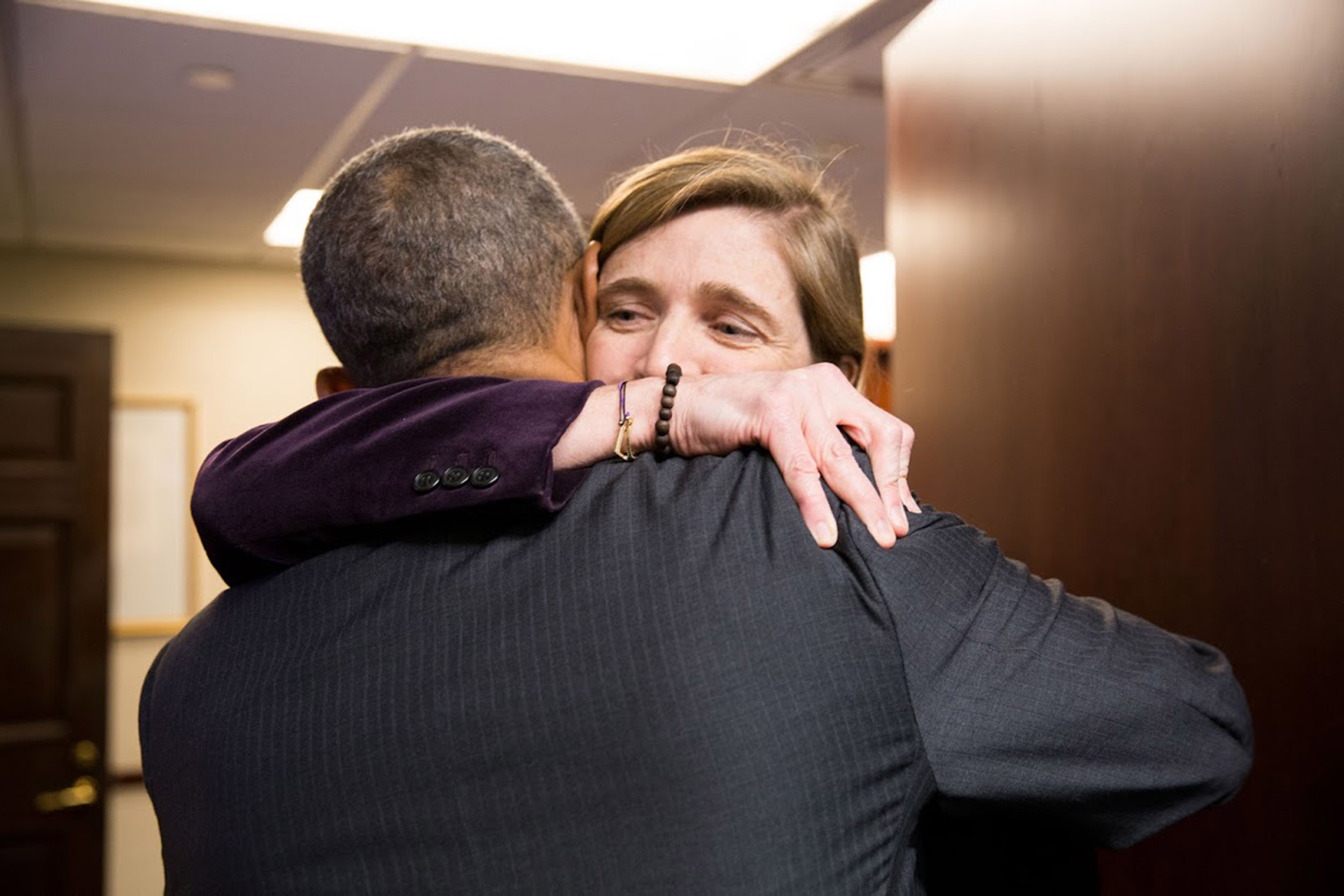
President Obama hugs Ambassador Power farewell in the Situation Room of the White House, Jan. 17, 2017.
Official White House Photo by Pete Souza
GAZETTE: Do you ever see yourself returning to government?
POWER: Oh, I’d love to return to government. It’s the best thing I ever did. The wreckage in the wake of this administration will be so great that I think all of us are going to have to find a way to help chip in, whether it’s from academia [or] … encouraging people to go into government or being back in government. You do realize, especially when you see somebody like Trump, but even working for somebody as unique as Obama, that the individual you work for makes a huge difference in terms of whether you are able to effectuate your agenda or even just make sure your voice is heard. Obama, even when we disagreed, was really unusual in seeking out alternative viewpoints. From the very beginning, he said “I want a team of rivals.” Bringing me in as a member of his cabinet — a human rights activist, a former journalist — I think was also a reflection of that — just wanting the widest possible range of views to be heard before he pulled the trigger in making a decision.
GAZETTE: What are you working on now? I understand that you’re writing a memoir?
POWER: Yes, I’m writing a book that’s provisionally called “The Education of an Idealist” that’s really meant for young people who want to make the world different, and are skeptical that government or state institutions can be the right venue for them. I aim to convince them that there’s almost nothing more impactful that they can do, even though it’s not always easy, but that the solidarity and the integrity of the enterprise is just immensely satisfying and that, even though the media will always cover the bad news, I aim also to show the kind of impact that public servants can have when they put their minds to it.
This interview has been edited for clarity and length.




